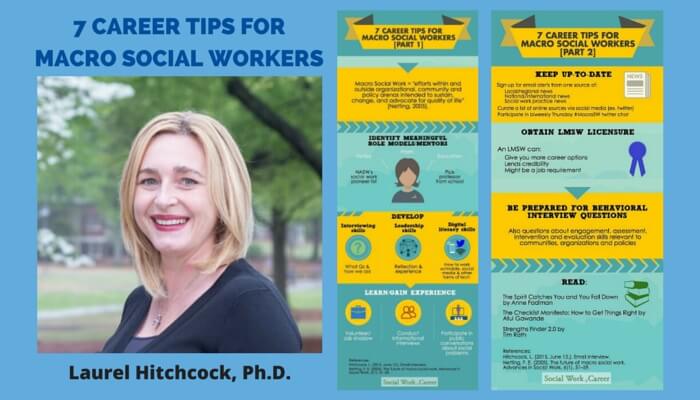 Career Advice Every Macro Social Worker Needs to Know
Career Advice Every Macro Social Worker Needs to Know
Are you interested in becoming a Macro Social Worker? Are you wondering what a Macro Social Worker does and/or what skills and experience you need to develop? This post is a bit long, but it is full of valuable nuggets of career guidance for current and potential macro social workers !
Laurel Hitchcock. Ph.D., an Assistant Professor in the Department of Social Work at the University of Alabama at Birmingham, is known for being an innovator within the social work education arena. In 2012, Laurel received the SAGE/CSWE Award for Innovative Teaching for her work incorporating different social media assignments into her courses.
As a result of our mutual involvement in social media, I had the good fortune of meeting Laurel and she kindly agreed to this interview about Macro Social Work, her area of expertise.
Thanks to Laurel, you will learn:
- What Macro Social Work is
- Where to find role models/mentors to learn from
- What are the key macro social work skills you need to develop
- Whether obtaining your LMSW licensure is worthwhile
- How to gain experience in the field
- The types of job interview questions to expect
- What is the #MacroSW twitter chat
- How to stay informed
- The 3 books every social worker should read
The below infographic provides you with a snapshot of the key take-aways. To benefit even more, make sure to read the wonderful interview with Laurel following the chart!
Interview with Laurel Hitchcock. Ph.D.
Laurel, What led you to become a professor of social work with a focus on macro social work?
I have always considered myself to be a community-focused social worker regardless of where I was working or what I was doing as a social worker. This started when I was a Peace Corp Volunteer in Senegal, West Africa in the early 1990s.
For two years, I lived in a rural community as a health volunteer, working primarily with women’s groups on immunization programs, malaria prevention and baby growth monitoring efforts.
As a volunteer from another country, I had to be accepted by the community before I could effectively work with individuals or the women’s groups. This meant learning about the local community and its culture, and meeting and talking with people from different constituencies of the community.
From the Peace Corps, I went on get a Masters in Public Health from the University of Alabama at Birmingham and a Masters in Social Work from the University of Alabama. I’ve worked in a variety of practice settings including a homeless healthcare agency, an emergency room, a domestic violence prevention program, a community mental health center and a medical research center.
My desire to become a social work educator grew out of my time as a program manager at community mental health center. I trained and supervised bachelor-level social workers to work with seriously mentally ill adults, and realized that I enjoyed helping other social workers learn and grow as professionals.
This desire to teach led me back to school and I earned my PhD in social work from the University of Alabama in 2009. Social work education has been my area of practice since that time.
Today, I am most interested in the best practices for teaching and learning in higher education, specifically how can we educate and train and educate people to be quality, effective social workers.
What is “macro” vs. clinical or micro social work? And could you give us some examples of macro social work?
I’ve always liked Ellen Netting’s (2005) explanation of macro social work practice as “efforts within and outside organizational, community and policy arenas intended to sustain, change, and advocate for quality of life” (p. 51).
This definition is inclusive enough to include activities with individuals or small tasks groups, direct or indirect tasks, and acknowledges the role of policy as a social work practice.
Micro social work practice includes those activities with individuals, families and treatment groups intended to change or prevent biopsychosocial problems that affect quality of life.
The bridge between macro and micro social work practice is best understood through the lens of the person-in-environment perspective.
One classic example of macro social work positions are managers in social service organizations who administer programs, supervise clinical staff, and make sure things run smoothly from a policy and administrative perspective.
Another example is the public health social worker who works to improve the health of populations. A public health social worker completes community assessments, plans and implements health-focused preventative and rehabilitative interventions, and works to assure that individuals and communities have access to services that promote health.
Also, I believe that social work educators can be considered macro-level social workers because they engaged in educational, training and supervision activities along with policy work that influences what goes on in classrooms, curriculum development, and gatekeeping responsibilities in the profession.
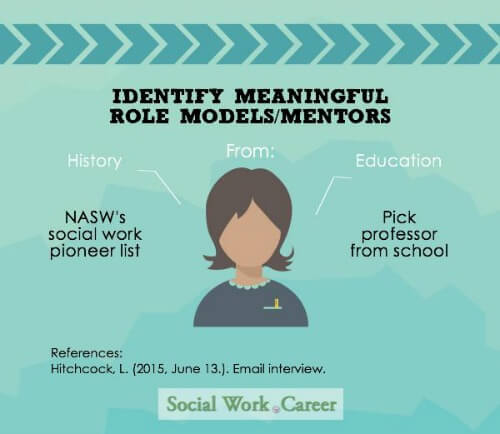 Who are some good role models for macro social workers to observe/learn from?
Who are some good role models for macro social workers to observe/learn from?
I believe in finding role models and/or mentors that are meaningful and unique to an individual, and so I suggest to my students identify their own role models from some of the following key areas of professional social work practice:
History – There are so many wonderful examples of pioneering social workers from the past 100 years who have helped make the profession what it is today. It is important to know who these individuals are and what they did to help individuals, communities and the profession during their time.
My favorite historical role model is Julia Lathrop, the first chief of the US Children’s Bureau from 1912 to 1921. Even when she was not even eligible to vote as a woman, she led a federal agency and instigated ground-breaking research studies on how poverty contributed to infant and maternal mortality.
The effects of her work can still be seen in federal funding for preventative health care services for women and children. A great resource to find a role model from the past is NASW’s social work pioneer list.
Education – When in college working on an undergraduate or graduate degree, I encourage students to identify a professor from their School or Department of Social Work that they respect and/or find interesting, and then cultivate a professional relationship with that person.
By having a faculty mentor while in college, a student increases chances that they will graduate. Then by maintaining that relationship after graduation, a social worker can stay connected with their alma mater, learn about new opportunities such as jobs and scholarships for graduate school, and always has an identified person to ask for a professional reference.
I have two former adjunct professors that I still keep in touch with from days as an MSW student. These relationships have helped me navigate career decisions and have also led to speaking engagements and other work opportunities.
Additionally, I stay in touch with my former students who have make the effort and I love to hear what and how they are doing. I frequently provide a recommendation or connect with different opportunities such as a job, speaking engagement or continuing education.
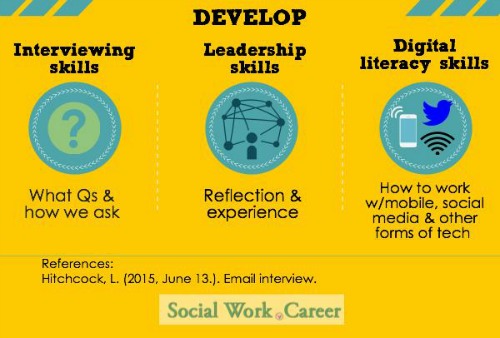 What are the top skills you recommend macro social workers develop?
What are the top skills you recommend macro social workers develop?
First, macro social workers should be encouraged to develop their interviewing skills, both in terms of the questions we ask and how we ask them. For example, interviewing an individual about their community requires the same skills as interviewing them about their psychosocial problems (engagement, open-ended questions, etc).
Second, leadership skills are essential for macro social workers, even if you are not employed in a leadership position. You never know when might be called to lead a meeting or working group. Leadership skills improve over time with the help of reflection and experience.
One tool that social workers can use to assess and develop their leadership skills is the Leadership Competencies and Framework developed by the Maternal and Child Health Bureau. While this model is focused on maternal and child health work, it could be easily adapted by an individual to their own practice setting.
Finally, macro social workers need to develop digital literacy, which is the knowledge, skills and behaviors needed to work with mobile devices, social media and other forms of digital technology.
For example, as social worker, could you explain to the president of a neighborhood association how their organization could use Facebook to organize and promote their work? Or do you know how to use your tablet or smartphone to professionally network with other social workers?
Digital media literacy is important because of the rise and fast-paced changes in social media and digital technology into our personal and professional lives in the 21st century. To learn more about digital media literacy, I recommend the book Net Smart: How to Thrive Online by Howard Rheingold or Henry Jenkin’s website about New Media Literacies.
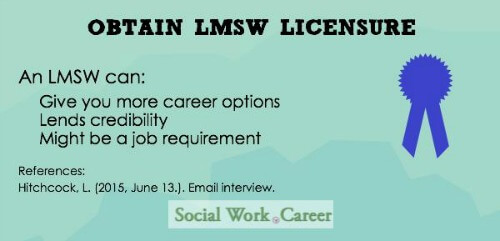 Do you advise macro social workers to obtain their LMSW licensure irrespective of its clinical focus?
Do you advise macro social workers to obtain their LMSW licensure irrespective of its clinical focus?
Yes, because we do not know where life will take us along a career path, and having a license at any level gives a social worker options throughout her or his career. You can start working in a macro position and then find that he or she needs to take a job with more of a clinical focus.
Further, a social worker can use a clinical focus in macro positions, and being a licensed social worker can lend credibility or might even be a requirement for the job. When I was doing supervision and program management at a community mental health center (a classic macro job within an organization), I needed to have my license in order to supervise case managers and manage a continuing education program for the agency.
As a social work educator, being a licensed social worker informs how I educate and advise students on social work licensure and helps me to stay current on important regulatory and practice issues.
I think it is also important to recognize that social work licensure is state-based, and some states offer macro-level credentialing for social workers. I’m a licensed certified social worker (LCSW) in the State of Alabama with a Private Independent Practitioner (PIP) Certification.
Some of the areas of my certification under the PIP include community organization, social work administration and social work research, all macro-level specialties. There might be similar examples in other states that could inform a nation-wide model of macro-level licensure or certification in social work.
I realize that it is expensive to obtain and maintain a social work license, and if a macro-focused social worker pursues the path of licensure, it should be taken seriously. Learn about licensure and all the steps to becoming licensed in the state or states where you are working.
Spend time studying and preparing for the licensure exam. Consider asking an employer to cover the cost of the exam if successfully passed. Maintain the license per the laws of your state’s regulatory body, and get involved with local groups or peers invested in social work practice in your community.
Advocating for changes in state-level social work licensure laws or at the national-level is a valuable contribution to the social work profession as a whole.
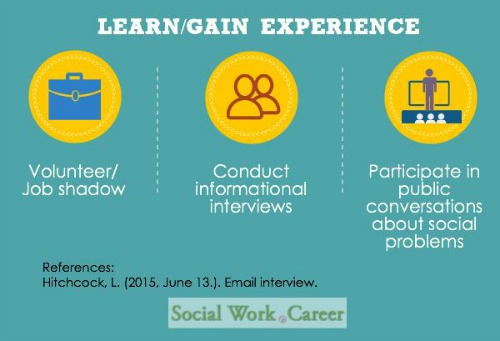 For social workers with no prior experience, what is the best way to seek a macro social work position? Through volunteering?
For social workers with no prior experience, what is the best way to seek a macro social work position? Through volunteering?
Volunteering with an organization is always good, but I would encourage someone to be savvy about how they volunteer. Look for ways to creatively help with an organization such helping with the organization’s newsletter or blog, serving in mentoring roles with the organization’s clients or offering to review/write grant applications for an agency.
Focus on your strengths and identify specific ways that you can help. Then, be consistent with your volunteer efforts. If you say you are going to do something for an agency, do it and bring your best work to the project or effort.
Other ways get noticed by an agency include networking with an organization’s staff through informational interviewing or job shadowing for a day. In fact, it would be good to do informational interviews with multiple organizations to learn more about the professional networks in your community.
Besides this blog, the career services office at your alma mater is an excellent resource for helping you to draft a plan for conducting informational interviews or locating organizations for job shadowing.
Finally, consider participating in public conversations about social problems that interest you. This means attending and speaking up at public meetings in your community, writing a letter to the editor of your local newspaper or using social media to professionally communicate about an important social problem.
For example, you could follow an agency on Twitter and then tweet or re-tweet information that might be relevant to that agency. The Social Work Career blog post How to Build Your Online Authority and Make Friends offers some great ideas for social workers on how to approach developing an online identity to engage in public discourse.
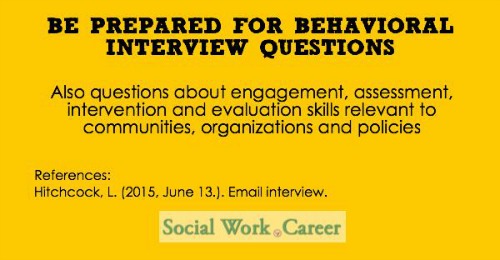 Looking over the list of 40 interview questions every social worker must know, what questions would you add that would be unique to macro social workers?
Looking over the list of 40 interview questions every social worker must know, what questions would you add that would be unique to macro social workers?
I would include questions that ask about engagement, assessment, intervention and evaluation skills relevant to communities, organizations and policies such as:
- How would you go about assessing a community?
- How would you evaluate consumer satisfaction with services provided by this organization?
- How would you develop an advocacy agenda for our agency?
I would also encourage macro social workers to learn about Behavioral Interviewing, which is a technique to learn more about your past work behavior as a predictor of your future work behavior.
As one of the hosts of the biweekly #MacroSW, can you tell us a bit about the chat and what impact you feel it is having on the macro social work field?
I have been involved with the #MacroSW chat for about a year as a guest host, and more recently joined the team as a collaborator and regular host in April 2015. #MacroSW a live, bi-weekly chat hosted via Twitter where social workers get online at the same time and have a conversation by exchanging tweets in real-time.
To learn more about Live Twitter Chats, check out the blog post I wrote about how to participate in a live Twitter Chat.
The topics are different for each chat and include such topics as financial social work, advocacy skills, engaging elected officials, and income inequality. There is always a host to guide the conversation and we provide a transcript at the end of chat so anyone can read the conversation.
Our collaborators include Association for Community Organizing and Social Administration; Karen Zgoda, MSW, LCSW, Instructor of Social Work at Bridgewater State University; The Macro Social Work Student Network; Network for Social Work Management; Rachel West, The Political Social Worker; University at Buffalo School of Social Work; University of Southern California School of Social Work; Sunya Folayan, MSW, ACSW, founder/executive director, The Empowerment Project, Inc.; and Kristin Battista-Frazee, MSW, Author and Marketing Consultant.
Perhaps the most influential effect is that #MacroSW is creating an online community of social workers interested in macro practice, regardless of knowledge or experience. We work to engage social work students, practitioners of all levels, and individuals from other professions in our conversations. We provide a virtual space for macro social workers from all over the country and world to meet and talk.
Some of us would have never met if not for the opportunity to engage with each other without #MacroSW. Also, the #MacroSW chat is providing a meaningful contribution to the public discourse about macro social work, specifically, and the social work profession, generally. A great example of this is our recent chat with Michael Brooks of the Center for Clinical Social Work about building common ground between micro and macro social workers.
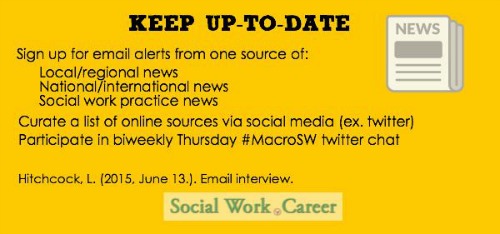 Which are the most important resources you recommend for macro social workers to read to keep up-to-date?
Which are the most important resources you recommend for macro social workers to read to keep up-to-date?
I recommend finding a good resource for local/region news, one for national/international news and another general social work practice news, and then signing up for their email alerts.
For information about your areas of interest, I recommend curating a list of online resources via a social media platform such as Twitter. For example, here is my reading list:
- Daily email from a state-wide advocacy agency called Alabama Arise, which contains a curated list of articles from Alabama and national news sources about policies and programs affecting income inequality and low-income individuals and families.
Each email contains a list of approximately 20 different articles about topics ranging from education equity, access to healthcare and food insecurity. I read or scan it every morning and find it to be a great resource to learn about what is going on in my state.
- Daily email from the New York Times about the latest national and international news. This email includes all types of news from sports to international affairs, but I always find one or two items are relevant to my daily interactions and help inform my thinking as a social work educator.
- For general social work practice information, I get email alerts from Social Work Today and The New Social Worker. I also read the NASW News online monthly.
- For my specific areas of interest, I have created lists on Twitter which I check daily. The list feature in Twitter works as a filter, allowing a user to identify specific topic areas and then add users to the list. For example, because I am interested in social work education, I have a public Twitter list of social work educators from around the world.
My goal with each of these online resources is not to overwhelm myself with information, but briefly read or scan each source daily and learn one or two new things. I will bookmark the information if it is something I want to follow-up with later.
I don’t worry if I miss a day and I don’t try to read everything. I also delete emails if I can’t read them within a day or two. Knowing when and how to pay attention to information is an important skill when information is so readily available.
Lastly, which are the top 3 books you’d recommend for every macro social worker?
One of my all-time favorite books is The Spirit Catches You and You Fall Down by Anne Fadiman [affiliate link]. It is a book about a young Hmong girl, her family and how the medical community responds to her chronic health condition.
There are so many lessons to be learned from this book including how to work with different cultural and professional communities, how to ask meaningful questions, and what does it mean to be a helping professional. I routinely require students in my courses to read this book.
I also recommend The Checklist Manifesto: How to Get Things Right by Atul Gawande [affiliate link]. This book shows how a simple check list protocol can make a big difference in providing care and services to people and communities. The author offers powerful examples of how interventions can be quick and simple while still being effective.
Finally, Strengths Finder 2.0 by Tim Rath (or Now, Discover Your Strengths by Marcus Buckingham and Donald Clifton [affiliate links] which includes an assessment and framework for identifying and discovering your strengths and talents.
Targeted for the business community and managers, this book shows people how to identify their strengths and then focus their attention on how to develop these strengths rather than working only to improve weaknesses.
It shows an individual how they can bring their own strengths to almost any work role or task. This book reminds me that social workers can apply the strengths-based perspective to themselves as individuals and in our professional community.
Thanks so much, Laurel, for providing us with such valuable career advice!
What are your thoughts about macro social work? Is this a field that you currently work in, or are considering?
References:
Netting, F. E. (2005). The future of macro social work. Advances in Social Work, 6(1), 51–59.

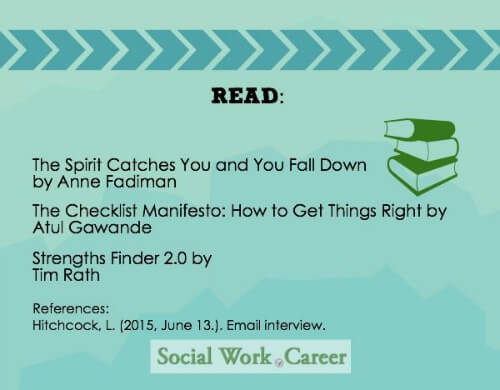


What a helpful article! Excited to use several of the tips shared!
Hi Sandoval,
Thanks so much for your kind feedback. I’m so glad that you found the interview with Laurel helpful.
Best,
Dorlee
Great tips here, I only had a few more comments that I posted on Twitter as well.
Look to big business for ideas to promote a mission. @TOMSshoes is great at tying a product to a cause. SWS can reach out to businesses for their causes. http://www.toms.com/what-we-give
Apply to jobs outside of the social work. Our skills are transferable. Mar/com, policy orgs, govt, human resources are good places to start for jobs.
Hi Kristin,
Thanks so much for stopping by to share some additional advice that Macro Social Workers may find helpful!
I love these creative ideas of connecting with big business to help support a cause (and Toms is a great example of one company that makes a point of doing this) as well as the suggestion to expand one’s horizon beyond social work and consider marketing, communications, human resources departments in addition to policy and governmental type organizations.
Thanks again!
I love this website! awesome info. great job, Dorlee! More Blessings to you <3, L.
Hi Liping,
Thanks so much for your kind feedback! I’m so glad you like Social Work Career’s new look. (It migrated to wordpress and received its facelift back in January.)
Hugs and blessings to you as well!
Thank you for inviting my comment Dorlee. I found this interview very comprehensive and helpful for new social workers. As you know, I’ve been in “macro-social work” since the late 70’s, before community based social service had a specialty in social work schools. Professor Hitchock gave a detailed and good-sense interview, and new social workers should take her advice to network, volunteer, engage mentors-all of it in service of developing a supportive community and, perhaps even creating something new that didn’t exist before.
Hi Susan,
Thanks so much for stopping by to share your your thoughts and reactions to this interview with Laurel.
It appears that your extensive experience both as a “macro social worker” and social work career counselor concurs with all the wonderful guidance that she had to offer.
I love how you have highlighted the importance of networking, volunteering and engaging mentors for career success – and raised the idea of collaboration for the purpose of innovation!
Thanks again!
Hello,
My name is Susan and I’m 60 years old and will be beginning my Bachelor’s program in social Work in the Fall. As you see I’m a non-traditional student. What I’m wondering is, what would you advise someone of my age to be extra-prepared for when looking for a position in Macro-Social Work?
Hi Susan,
How exciting that you will be starting your Bachelor’s in Social Work this Fall! You’ve asked a good question and I will reach out to Laurel so that she may respond to you at her earliest convenience.
Wishing you the best of luck,
Dorlee
Hello Susan! Congratulations on starting your BSW program! I hope you find social work as rewarding of a career as I do. I personally don’t think there is anything special you need to do to prepare for your social career because of being a non-traditional student. I think all social work students should take their studies seriously by learning the content of all social work courses, focusing on their writing skills, and developing their practice skills. Being familiar with and being to use technology is also important. If you are most interested in a macro-focused job, I would recommend searching out job shadowing experiences with macro social workers in your area, volunteering at an advocacy-based agency and consider taking elective courses in that focus on macro content such as grant writing, administration and/or public health. Also, ask for a macro-level field placement. If you are familiar with Twitter, you may want to join the #MacroSW live Twitter chats on Thursdays at 9 PM EST. You can learn more about the chats here: http://macrosw.com. I hope this is helpful information for you.
Does anyone else have some thoughts for Susan? Many thanks to Dorlee for her wonderful blog! Happy New Year!
Laurel